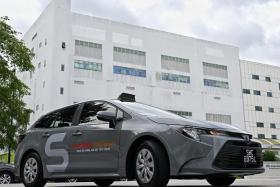MP: Let's hit errant PMD users hard
Calling a ban 'a blunt tool', Lim Biow Chuan calls for crackdown on rule-breaking riders and long-term solutions such as wider footpaths
Lawmakers and observers are in two minds about a ban on personal mobility devices (PMDs), though one transport expert has joined the growing chorus against such devices.
The recent death of Madam Ong Bee Eng, 65, who was hit by a speeding, non-compliant e-scooter, has become a lightning rod for frustrations over irresponsible PMD users.
Mr Lim Biow Chuan, the MP for Mountbatten SMC, said he hopes the Land Transport Authority (LTA) will come down hard on such culprits.
He told The New Paper it was tragic that PMD users have not got the message that they need to ride responsibly and safely.
"It was a waste of life... We ought to come down like a ton of bricks on such belligerent individuals," Mr Lim said.
But he was in two minds about a ban, calling it a blunt tool.
"I do empathise with pedestrians because I, too, worry when I walk...Society needs a lot more maturity to deal with the issue."
In 2017 and 2018, there were 228 reported PMD accidents on public paths, with 196 resulting in injury.
For Mr Lim, the long-term solution is to widen footpaths.
In August, Senior Minister of State for Transport Lam Pin Min announced a $50 million kitty to expand and improve active mobility infrastructure at accident hot spots.
Singapore University of Social Sciences (SUSS) transport economist Walter Theseira agreed that de-conflicting PMD users and pedestrians is crucial.
"The problem is the re-design of paths takes time. That is something I think people may feel we could move faster on."
But SUSS urban transport expert Park Byung Joon, who feels that footpaths must belong to pedestrians, strongly supports the banning of PMDs from footpaths.
He said that PMDs are a form of personalised wheeled transport, such as bicycles and motorcycles, and should be regulated in the same way.
Adding that Madam Ong's death was a matter of when and not if, Associate Professor Park said: "If it goes on like this, I'm afraid this will not be the last."
Prof Park suggested putting more effort into making walking more pleasant and concentrating on public transport, which the LTA has poured resources into improving.
Dr Theseira said it was reasonable to consider different solutions, including bans or partial bans, but any assessment has to look at relative risks.
"Even when we talk about a total ban, we have to recognise that we are probably going to shift some risk, for example, to increased use of motorcycles and bicycles," he added.
NO HARD DATA
But the Nominated MP said it was impossible to answer these questions without hard data.
Citing the fear of air travel and cars when they were first introduced, Dr Theseira said: "We're left with people making judgements based on what they hear in the media...
"People are not stirred up in the same way when they read about a car accident. These are also tragedies but they don't stick in our head the same way the PMD problem does."
Mr Lim said he hopes Singaporeans will continue to engage with the Government to find a fair and balanced solution.
"Right now, I think we need to let emotions cool a bit because when someone passes away, everyone is angry."
Marsiling-Yew Tee GRC MP Alex Yam also acknowledged the angst over PMDs.
"It's novel not just for us but for many jurisdictions," he said.
Workers' Party Non-Constituency MP Dennis Tan said enforcement and public education efforts have been playing catch-up and he urged the authorities to step them up more.
Mr Tan said: "If such efforts are insufficient or need to take a longer time... perhaps the Government needs to re-look the current regimen and make some changes...There must be political will to ensure compliance, whether with existing laws or if there is a ban."
Get The New Paper on your phone with the free TNP app. Download from the Apple App Store or Google Play Store now



